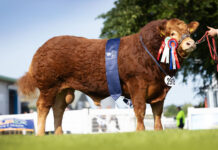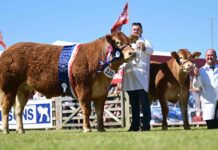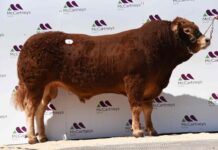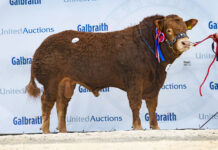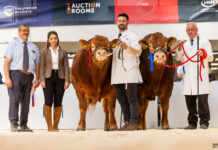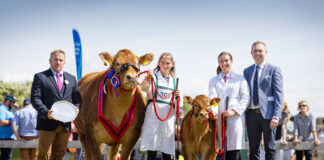The eating quality and tenderness of British Limousin beef has been highlighted in 2010 with a hat-trick of wins in the three prestigious steak tasting competitions held through the summer by Tesco-McIntosh Donald, and Asda-ABP respectively at the Royal Highland and Great Yorkshire Shows. The Tesco-McIntosh Donald event was won with a steak from a Limousin sired heifer, whilst both Asda-ABP competitions saw steaks from Limousin sired young bulls secure the top prize.
Since 2002, Limousin steaks have won these respective titles on eight occasions with the Asda-ABP competition having been introduced in 2008.
In each competition instance, the criteria to judge the eating quality of the beef was based on taste, texture and flavour, with an emphasis being placed on tenderness. Commenting on this particular trait McIntosh Donald Managing Director, Alan McNaughton, said tenderness was the most important characteristic of meat in the eyes of consumers, even before flavour. “Our research has shown that if meat is tender, consumers are happy but if it’s tough, they are most unhappy,” said Mr. McNaughton.

Both of the Asda-ABP competition winners were steaks from Limousin sired young bulls and Jim Viggars, Asda’s senior meat buyer, and one of the competition judges, also picked up on the importance of tenderness. Commenting after the Great Yorkshire Show he said: “Similar to the steak competition at the Royal Highland, a young bull has come out on top and again reinforces the correlation between young bulls and tenderness. Not only is this ideal for producers in terms of maximising growth rates in a short space of time, there is also a positive link in terms of tenderness and eating quality.”
Increased tenderness in Limousin sired beef has been highlighted in international research of the F94L myostatin gene which is found to occur with high frequency in Limousin cattle but with very low frequencies in other breeds. Using the laboratory shear force test, meat from animals with two copies of the F94L gene were shown to require 11 percent less force to cut a sample of the eye round muscle compared to animals with no copies of the gene.
The amount of force required to cut the loin muscle from animals with two copies of the gene was six percent less than the force to cut the loin muscle from animals with no copies of the gene. The F94L gene was also shown to cause a 20 percent reduction in intramuscular fat and a 30 percent reduction in external fat cover resulting in healthier beef and higher yields of retail beef from each carcase.
Iain Kerr, the Chief Executive of the British Limousin Cattle Society, said that retailers had continued to give a clear message of their desire to provide customers with high quality, tender beef that provided an enjoyable, and repeatable, eating experience. He felt that British Limousin sired beef was consistently meeting this specification: “Research has confirmed the increased tenderness of Limousin beef and its healthfulness in terms of saturated fat and cholesterol content. These tasting competition wins over a sustained period, and the high percentage of Limousin sired finalists within, underline the consistency, eating quality and flavour of British Limousin beef,” he said.
British Cattle Movement Service figures for 2009 show that Limousin sired animals represent a 32% market share of beef animals registered in the year.


